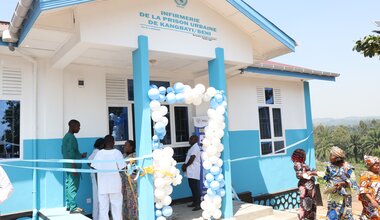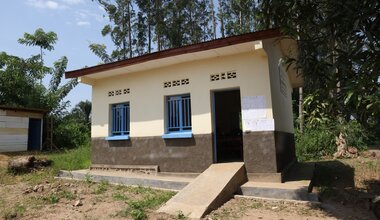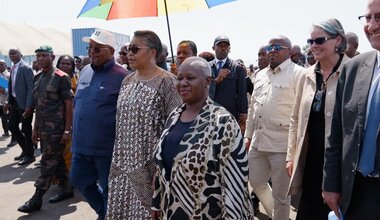MONUSCO Supports Workshop to Raise Awareness about Legislation Criminalizing Torture
Bukavu, 7 August 2012 – A workshop aimed at disseminating legal provisions criminalizing torture was held in Bukavu on Tuesday, 7 August 2012. Participants included officials from State services involved in criminal investigation, as well as representatives of Human Rights NGO's. The workshop was organized jointly by the National Ministry of Human Rights, the Office of the Governor of Sud-Kivu, and the United Nations Joint Human Rights Office.
Bukavu, 7 August 2012 – A workshop aimed at disseminating legal provisions criminalizing torture was held in Bukavu on Tuesday, 7 August 2012. Participants included officials from State services involved in criminal investigation, as well as representatives of Human Rights NGO's. The workshop was organized jointly by the National Ministry of Human Rights, the Office of the Governor of Sud-Kivu, and the United Nations Joint Human Rights Office.
The Vice-Minister of Human Rights, Mrs. Maguy Selemani Sakina Binti, led the opening ceremony, which was attended by several provincial authorities and MONUSCO's Head of Office in Sud-Kivu, Mr. Aliou Sene who welcomed the objective of this workshop "in Sud-Kivu province where the practice of torture still constitutes an evil to combat". In his remarks he also expressed hope that publicizing this legislation would further promote and reinforce the fight against torture and renewed MONUSCO's commitment to support the various actors involved in combating torture in Sud-Kivu.
The presentations delivered in the workshop covered various topics, including international legal instruments on torture, the general scheme and implications of the Law n°011/008 of 9 July 2011 for the fight against torture, the standards of professional and personal ethics as required of national armed forces (FARDC) and police (PNC) officers, and security services officials and agents for the application of the law penalizing torture, as well as the role of the Human Rights Liaison Entity for Sud-Kivu.
This one-day meeting culminated with the official launch of the Human Rights Liaison Entity, the setting up of a committee designed to monitor the campaign to raise awareness of the law across the territories, and the establishment of the Provincial Human Rights Division in Bukavu.
As the Vice-Minister of Human Rights noted in her statement remarks during the opening ceremony, the Democratic Republic of Congo has since 18 March 1996 ratified the 10 December 1984 United Nations Convention against Torture and Other Cruel, Inhuman or Degrading Treatment or Punishment. However, the harmonization of its internal legislation with the Torture Convention did not take place for at least a decade. In its Article 16, the DRC's Constitution of 18 February 2006 forbids torture and any cruel, inhuman and degrading treatment whatever the circumstances. With the law n°011/008 of 9 July 2011, the DRC has treated specific acts of torture and the attempt to commit them as criminal offences.
MONUSCO/Biliaminou Alao
 ONU
ONU Nations Unies Maintien de la paix
Nations Unies Maintien de la paix




